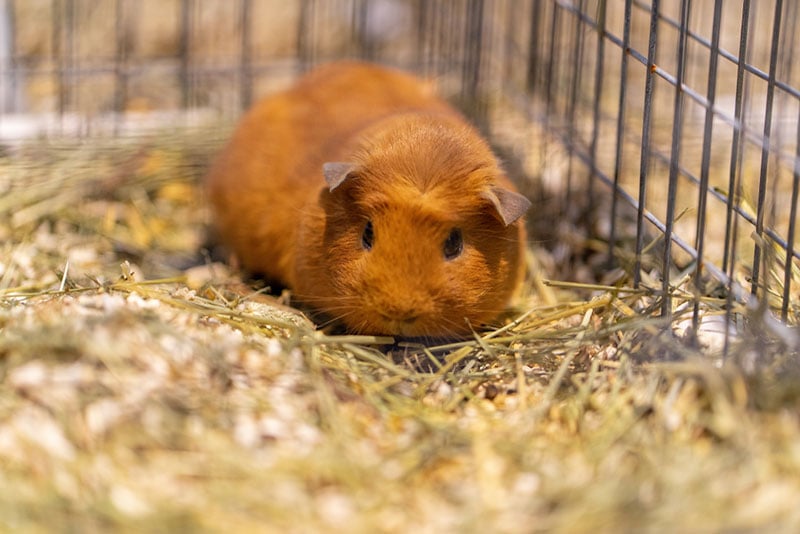
Wondering if your guinea pig can eat blueberries? The short answer is yes, they can!
In moderation, blueberries have several health benefits for your guineas. These delicious berries contain valuable antioxidants and vitamins that are great for both you and your guinea. Plus, guineas love them!
However, blueberries contain high amounts of sugar and are fairly acidic, so they should be kept as occasional treats. Here, we take a deeper dive into the benefits and possible health concerns of blueberries.
 Diet of Guinea Pigs
Diet of Guinea Pigs
Guinea pigs are herbivores that do best on a diet that comprises high-quality pellets made specifically for them and an unlimited amount of good-quality hay. Examples of appropriate hay for guinea pigs include timothy, orchard, grass, and oat. Hay in conjunction with these pellets should form the overwhelming bulk of their diet. It should be offered in unlimited amounts, and guinea pigs should be offered 1 cup or so of pellets every day.
In addition to these two items, guinea pigs require a daily serving of fresh leafy vegetables (also about 1 cup) that are high in vitamin C. Examples include red bell peppers and parsley. Last but not least, guinea pigs should have access to fresh clean drinking water at all times.
Fruits like blueberries and certain grains can be offered to guinea pigs as treats. When given in moderation, these fruits can have health benefits for your guinea pig. However, they should not be permanent additions to their diet.

Health Benefits of Blueberries
The two most common types of blueberries are highbush blueberries, which are the most commonly cultivated variety, and lowbush or “wild” blueberries, which are a smaller, less common variety. The plant itself is a small flowering perennial shrub that can reach up to 4 meters in height. The berries start green and slowly deepen into a beautiful dark blue or purple color. Blueberries are among the most nutrient-dense foods on the planet and are packed with antioxidants.
Blueberries are often referred to as a “superfood” (for humans) because they are low in calories but extremely high in nutrients. They are healthy and easy treats to give to your guineas and have many health benefits:
Blueberries contain magnesium, iron, zinc, and vitamin K in trace amounts, which aid in overall health.
Health Concerns of Blueberries
Blueberries in moderation are a safe and nutritious addition to your guinea’s regular diet. However, there are small caveats to be aware of, as listed here:

How Many Blueberries Are Okay?
Most guineas love blueberries and will definitely eat more than they should if given the chance. However, too much of a good thing can cause them harm. So, how many blueberries is too many?
First, we recommend not giving them to your guinea daily. Some commercial foods contain dried berries along with pellets, and this can be highly detrimental to your guinea’s health. In fact, most fruits should not be given daily due to their high sugar content. We recommend one or two small blueberries twice a week per guinea pig. This will be enough so they benefit from the nutritional benefits in blueberries without suffering the health risks of overfeeding. There are several other fruits besides blueberries that you can give your guinea as treats to add variety.
While fresh blueberries are best, frozen blueberries are also a great option, provided that they are defrosted first. Dried berries, on the other hand, should be avoided, as these contain even more sugar content per gram than fresh berries. Blueberry leaves also contain beneficial antioxidants, and your guinea will love chewing away on them. If you can get them, these are also a great option for your guinea.
You should avoid giving blueberries to baby guineas, as they have strict dietary needs that must be adhered to. Lastly, we recommend giving small amounts of blueberries to your guineas at first, to see if they have any negative reactions, and then slowly increase their intake.
Conclusion
In conclusion, yes, your guineas can safely eat blueberries, albeit in moderation. Not only are they safe, but these little berries pack a nutritional punch that your guinea will both benefit from and love.
Blueberries have several beneficial vitamins that can add to the overall health of your guinea, and they are a tasty treat that they will relish. Blueberries will primarily provide essential antioxidants that will aid in your guinea pig’s health. They also contain vitamin C, and some fiber, and have a great low-caloric yet high-nutritional value.


 Diet of Guinea Pigs
Diet of Guinea Pigs





